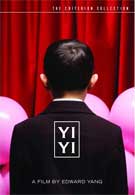Like the somber tones of Beethoven’s “Moonlight” Sonata that echoes through the Taiwanese nightclub, Edward Yang’s Yi Yi (A One and a Two) exhibits the universal nature of film. It pierces our notions of language and culture to show us that there is no such thing as a “foreign” film, as we all struggle with love, family and our place in the world. The film opens with a shotgun wedding and the disapproval of the family’s grandmother. When the grandmother slips into a coma, we follow this middle-class family as they struggle to find meaning in their own lives; N.J., the patriarch, is reunited with a lost love from his youth, as his teenager daughter is confronted with the complications of, presumably, her first relationship. Meanwhile, N.J’s wife sets out on her own spiritual journey and his youngest son explores the nature of truth and perception through the lens of his camera.
Yi Yi (2000) runs the risk of being written off in this day and age of introspective relationships dramas that are all the rage with “indie” movies, which are too preoccupied with their characters’ quirky cleverness to pose honest questions through relatable characters. Director Edward Yang capitalizes on long, quiet, contemplative pauses and a visual style, with shots ripped straight from Japanese director Yasujiro Ozu’s (Late Spring, Tokyo Story) frame, that lets us observe the character’s inner conflict and confusion. Yet, it is N.J and Yang-Yang’s honesty that makes Yi Yi work as well as it does. N.J. wrestles with corporate ethics when his company decides to sign a software deal with a cheap imitator of Ota, a software designer he has befriended both professionally and personally. While his partners are eager to toss Ota aside in order to make a quick buck, N.J. stands up for his ethical beliefs and leaves the company. Driven by pride and conviction, N.J. exhibits the same integrity as when he left his lover, Sherry, years ago. He is haunted by his actions’ affect on others but, although he may regret the choices he has made, he wouldn’t change anything.
On the other hand, Yang-Yang pitter-patters along on his own quiet investigation of life. After asking his father how he is supposed to know what he is seeing is real if he can’t see what his father does, this little shutterbug tries to capture a complete view of the world through pictures of mosquitoes and the back of people’s heads. Although this may translate into “indie” cutesiness, it succeeds because Yang (the director) does not fill the young boy’s action with pretense. Yang-Yang’s actions are driven by his curiosity; he is not a sage in a five year-old’s clothing. He is the child in all of us that asks questions that we dare not utter aloud.
The other characters in the film serve to highlight themes brought to light by N.J. and Yang-Yang. N.J.’s daughter’s own relationship parallels his reconnection with Sherry. While his daughter may have been prepared to sleep with her “boyfriend,” N.J. was not interested in pursuing a new relationship with Sherry. Their meeting was for closure -- he could realize that he made the right decision years ago and for Sherry to know that he loved her.
However, the one character that seems to be given the shaft in the film is N.J.’s wife, who is absent throughout the majority of the film. In the beginning, she feels as if she is caught in an endless loop of predictable days and ends up leaving on a religious retreat. When she returns toward the end of the film, she is given a line or two to put her demons to rest. In comparison to the other characters, who are given the chance to pursue their problems on the screen, it seems unfair that she was given the same opportunity. Yet, some people deal with their problems by abandoning all aspects of a “normal life.”
Although it might be a nice idea for Yang to expand on this character, Yi Yi’s three hour runtime is already filled to the brim with substance and details that encompasses everything that almost every “indie” movie wants to be -- a poignant reflection of modern life, with all the emotional confusion and metaphysical questioning that we sweep under the rug. Yi Yi's latest Criterion Collection release goes above and beyond the previously available release from Fox Lorber. Criterion has toned down the brightness and over saturation of the Fox Lorber release, giving the film a fresh, crisp look, despite the presence of a few artifacts and blemishes here and there. The film is presented in anamorphic 1.85 : 1 widescreen, which is a huge improvement over the Fox Lorber release that was notoriously cropped on the right side. Although the film is quite silent, the stereo surround sound does an adequate job handling the dialogue, although you’ll be reading most of it as the film’s audio track is in Mandarin with some English dialogue.
The other audio selection is the feature length commentary with the director, Edward Yang, and Asian-cinema film critic Tony Rayns. They discuss the making of the film, as well as the new Taiwanese film movement that began in the 1980s. There is also a dedicated interview with both Yang and Rayns regarding the new movement in Taiwanese film. Although that is the meat of the disc’s supplements, this release also features the original U.S. theatrical trailer, an interesting essay by Kent Jones and notes from Yang. While the disc lacks the supplements that would completely justify the $39.95 price tag, the film presentation and DVD packaging makes Yi Yi worth picking up this month.
Your Daily Blend of Entertainment News

